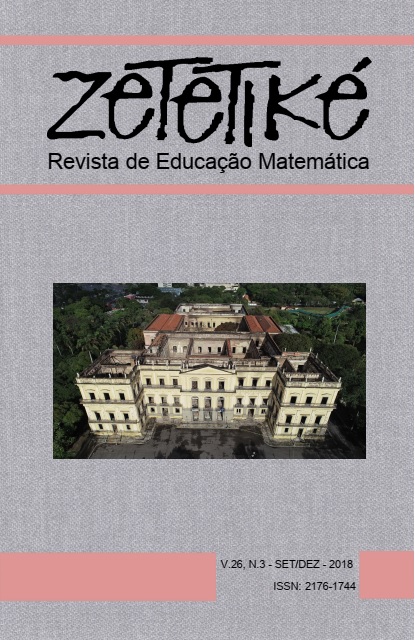Abstract
This paper describes the impact of a teachers' professional development programme that involves hands-on
Astronomy experiments, in mathematical teaching practices. Teachers attended workshops with mathematical
and science content and produced several tasks to be implemented in the classroom. With a Teacher Design
Research methodology, we investigate how teachers innovated their practices, designing and implementing
mathematical tasks, from Astronomy hands-on experiments. Data collection involved participant observation, interviews and portfolios created and presented by the teachers, within the scope of the training course. With a qualitative and an interpretative approach from the collected data, we conclude that teachers gained motivation to design and implement experiments with their students, namely enhancing the teaching of mathematics, from Astronomy hands-on experiments.
References
Abell, S. K., & McDonald, J. T. (2006). Envisioning a curriculum of inquiry in the elementary school. In Flick, L. B. & Lederman, N. G. (Eds.), Scientific inquiry and nature of science: Implications for teaching, learning, and teacher education (pp. 249-261). Dordrecht, Boston: Springer.
Abrahams, I., Reiss, M. J., & Sharpe, R. (2014). The impact of the getting practical: Improving practical work in science continuing professional development programme on teachers' ideas and practice in science practical work. Research in Science & Technological Education, 32(3), 263-280.
Afonso, M., Neves, I., & Morais, A. M. (2005). Processos de formação e sua relação com o desenvolvimento profissional dos professores. Revista de Educação, 13(1), 5-37.
Ball, D. L. (2003). Mathematics in the 21st century: What mathematical knowledge is needed for teaching mathematics. Paper presented at the Secretary’s Summit on Mathematics, U.S. Department of Education, Washington, DC.
Ball, D. L., Thames, M. H., & Phelps, G. (2008). Content knowledge for teaching what makes it special? Journal of teacher education, 59(5), 389-407.
Bannan-Ritland, B. (2000). Teacher Design Research. An emerging paradigm for teachers' professional development. In A. E. Kelly & R. A. Lesh (Eds.), Handbook of Research Design in Mathematics and Science Education (pp. 246-262). Mahwah, NJ: Lawrence Erlbaum.
Beane, J. A. (1995). Curriculum integration and the disciplines of knowledge. The Phi Delta Kappan, 76(8), 616-622.
Berlin, D. F., & Lee, H. (2005). Integrating science and mathematics education: Historical analysis. School Science and Mathematics, 105(1), 15-24.
Baxter, J. A., Ruzicka, A., Beghetto, R. A., & Livelybrooks, D. (2014). Professional development strategically connecting mathematics and science: The impact on teachers' confidence and practice. School Science and Mathematics, 114(3), 102-113.
Cobb, P., Jackson, K., & Dunlap, C. (2014). Design research: An analysis and critique. Handbook of international research in mathematics education, 481-503.
Cohen, L., Lawrence, M., & Keith, M. (2007). Research Methods in Education. 6th Edition. Taylor and Francis Group.
Costa, M. C.; & Domingos, A. (2017). Innovating teachers’ practices: potentiate the teaching of mathematics through experimental activities. In CERME 10: Dooley, T., & Gueudet, G. (Eds.) (2017). Proceedings of the Tenth Congress of the European Society for Research in Mathematics Education (CERME 10, February 1-5, 2017, pp. 2828-2835). Dublin, Ireland: DCU Institute of Education and ERME.
Fleisch, D.; Kregenow, J. (2013) A Student's Guide to the Mathematics of Astronomy. Cambridge University Press.
Geiger, V., Goos, M., Dole, S., Forgasz, H., & Bennison, A. (2014). Devising principles of design for numeracy tasks. In Curriculum in focus: Research-guided practice: Proceedings of the 37th annual conference of the Mathematics Education Research Group of Australasia (pp. 239-246).
Hewson, P.W. (2007). Teacher Professional Development in Science. In S. K., Abell & N. G., Lederman, Handbook of research on science education (pp. 1177-1203). New York: Routledge.
Kalkan, H., & Kiroglu, K. (2007). Science and nonscience student’s ideas about basic astronomy concepts in preservice training for elementary school teachers. Astronomy Education Review, 6(1), 15-24.
Keeley, P.; Sneider, C. I. (2012). Uncovering student ideas in astronomy: 45 formative assessment probes. NSTA Press.
Lavonen, J., Byman, R., Juuti, K., Meisalo, V., & Uitto, A. (2005). Pupil interest in physics: a survey in Finland. Nordic Studies in Science Education, 1(2), 72-85.
Luft, J., Hill, K., Nixon, R., Campbell, B.; Dubois, S. The knowledge needed to teach science: Approaches, implications, and potential research. In annual meeting of ASTE. Portland, OR, 2015.
Ministério da Educação (ME). (2013) Metas Curriculares de Matemática. Programa de Matemática para o ensino básico - 1.º Ciclo. Lisboa: Departamento da Educação Básica. Retirado em 15 de junho, 2018 de: http://www.dge.mec.pt/matematica.
Ministério da Educação (ME). (s. d.) Programa de Estudo do Meio para o ensino básico - 1.º Ciclo. Lisboa: Departamento da Educação Básica. Ministério da Educação. Retirado em 15 de junho, 2018, de: http://www.dge.mec.pt/ estudo-do-meio.
Morgan, D. L. (1997). The focus group guidebook (Vol. 1). Sage publications.
Murphy, C., Smith, G., Varley, J., & Razı, Ö. (2015). Changing practice: An evaluation of the impact of a nature of science inquiry-based professional development programme on primary teachers. Cogent Education, 2(1), 1077692.
Osborne, J., & Dillon, J. (2008). Science education in Europe: critical reflections. London: The Nuffield Foundation.
Rocard, M., Csermely, P., Jorde, D., Lenzen, D., Walberg-Henriksson, H., & Hemmo, V. (2007). Science education now: A renewed pedagogy for the future of Europe. Bruxelas: Comissão Europeia.
Treacy, P., & O’Donoghue, J. (2014). Authentic Integration: a model for integrating mathematics and science in the classroom. International Journal of Mathematical Education in Science and Technology, 45(5), 703-718.
Trumper, R. (2003). The need for change in elementary school teacher training—a cross-college age study of future teachers’ conceptions of basic astronomy concepts. Teaching and Teacher Education, 19(3), 309-323.
Zawojewski, J., Chamberlin, M., Hjalmarson, M. & Lewis, C. (2008). Developing design studies in mathematics education professional development: Studying teachers’ interpretive systems. Handbook of design research methods in education: Innovations in science, technology, engineering, and mathematics learning and teaching, 216-245.
Zehetmeier, S., Andreitz, I., Erlacher, W., & Rauch, F. (2015). Researching the impact of teacher professional development programmes based on action research, constructivism, and systems theory. Educational action research, 23(2), 162-177.

This work is licensed under a Creative Commons Attribution-NonCommercial-NoDerivatives 4.0 International License.
Copyright (c) 2018 Zetetike


